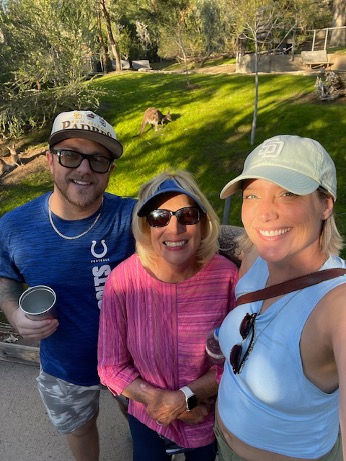Spiritual Direction With Survivors of Sexual Trauma
- annerichardson58
- Feb 15, 2025
- 4 min read
I just offered a training on Spiritual Direction with Survivors of Sexual Trauma. One in three women and one in six men will experience a sexual trauma in their lifetime. Sadly, this is so common and often comes up in spiritual direction.
In the training, I provided some stats and manifestations of sexual trauma. Shame is the most common. “Something is wrong with me.” “I am not enough.” “It was my fault.” “I somehow deserved this.” Let me say it,
Abuse Has No Excuse
It was NOT Your Fault.
I provided some open-ended questions to explore shame and a few practices that transform shame into Belovedness. “How do you see yourself?” “How does God see you?” One simple practice is to write down 20 characteristics about you. This is who God created you to be. Now spend time meditating on these truths about you. Neuroscience confirms that meditation re-wires the brain. This is not about emptying the mind, but noticing those toxic shameful thoughts, grabbing them and putting them in an imaginary cupboard while meditating on what God says about you.
This process takes time. But I KNOW first-hand that God can transform. I have moved from “Not Enough” to “Beloved Confidence.” And I have witnessed others do the same.
I also presented some open-ended questions for exploring their relationship with God. “What do you desire from God?” “What is your image of God?” to name a few. Many doubt God’s love for them and have a tainted image of God. “Why, God, did you allow this to happen to me??”
Spending time with God, exploring my faulty image, replacing that with truth, and experiencing more of God’s love and presence in my everyday life has been life changing. I talk to Jesus every day, just like a friend. We have a heartfelt conversation over coffee every morning. I feel more of his love deep within my soul. There is no ounce of condemnation or shame.
Another topic covered is Compassionate Listening. We live in a world where listening is becoming a lost art and yet so needed. True, some people are natural listeners. Yet people can learn how to be better listeners. Have you ever started speaking from your heart and then had someone change the subject? Or make it about them? Or start looking at their phone? I have. I feel unheard.
I covered what to say and do and what not to say and do. Many survivors tell me all the things others have said that made the shame deepen. Including church people. “Were you in a sexual sin, so that is why this happened to you?” I can’t believe what people say sometimes!! Although not intentional, most people don’t know what to say and do. And this is a very uncomfortable topic.
I briefly mentioned some cultural differences. As with survivors, try not to put a culture in a box. Ask them, “Tell me how your culture views ____?” They will tell you.
I provided open-ended questions to explore their relationship with God, shame, grief, anger, and forgiveness. In the book, I cover sex, sexuality, and the body since this comes up in direction with survivors. I included some practices that incorporate the body for a more holistic approach. Some of my colleagues said these questions are helpful for all kinds of trauma.
In the second half of the training was on what to do for you as the director, clergy, or pastoral counselor. We need to learn how NOT to carry or own their pain. We can come alongside, and then release them to God. He is the true spiritual director.
When we listen to people’s stories, something they say may trigger something in us. In listening, we put those thoughts and feelings in an imaginary box called, “Bracket.” Then, take that bracket to God and possibly to supervision.
I stressed the importance of being in supervision. We all have blinders on, and supervision can help us see what is blocking or triggering in us that makes us lose our presence in a session. There is no shaming here. We all can improve, learn, and change. I often say, “We grow until we go.”
Self-care is something else I brought up. We need to care for ourselves to pour into someone else. Burn out and compassion fatigue are real. I block mornings out so I can spend time with God, exercise, shower, eat, whatever. Then I am ready to pour!
Finally, I talk about when to refer to a therapist, somatic experiencing, 12-Step group or Crisis Center. We are their spiritual directors not their therapists.
I so enjoy offering these trainings. The next one will be May 6th. A desire of mine now is to “Pass on before I pass on.” I want others, particularly the younger generation, to know how to accompany those with broken, wounded hearts. There is hope.




Comments